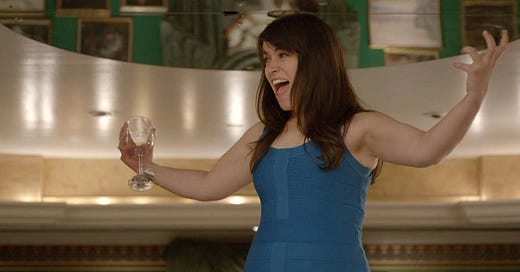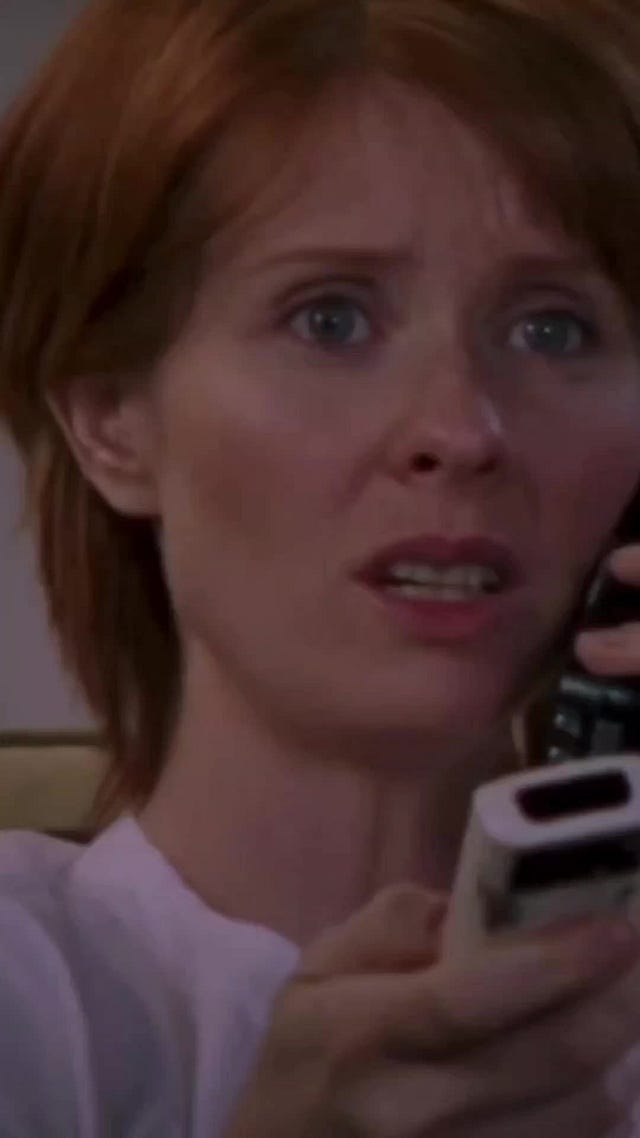In a 2014 episode of “Broad City” called “Stolen Phone,” the character Abbi realizes she lost her phone after talking to a guy who called her a “hot girl” and got her number. She panics about being unable to get his texts, and announces to a bar full of people that they must conduct a sweep to help her find it. This mission is critical, she explains, because this guy called her hot. Her!
She clarifies:
“I’m not, like, hot hot, and I know that. But he thinks I am!” is what’s implied. The assembly grasps the gravity of the situation and gets to searching.
Something shifted when I first saw this scene — I don’t think I’d seen any female characters on TV or in movies who spoke about themselves quite this way, who were forthright about and accepting of how they were less-than-hot in a culture with rigid definitions of what a “hot” woman is. Most women on screen didn’t talk about their appearance at all, or it was only crafted and defined by others (e.g., “She’s ugly until she takes her glasses off!” a la “She’s All That”), or they were smoldering beauties and knew it.
Abbi is hot to a lot of people (myself very much included), especially her best friend character Ilana, who is borderline obsessed with Abbi and constantly tells her she’s a goddess, has the “ass of an angel,” etc. What is “hot,” and beauty in general, is subjective on an individual level, but Abbi’s line is so sharp because it recognizes that despite that subjectivity, we all know what society and culture at large consider most hot, no matter how flawed and destructive that might be. Abbi doesn’t have the prototypical model, Instagram baddie, porn star, celebrity, It Girl, etc. look. She’s cute, she’s normal, and that’s entirely fine. She gets it.
This is how I feel about myself and what I look like, and wrote as much in my post “Weight loss made me obsessed with my looks”:
These absurdities do not spring from my belief that I’m an astonishingly hot woman. Somewhere, a commenter is Googling my picture and cracking his knuckles in preparation to assure me that I’m not. That’s fine. I know. I’m cute, but I get it.
What Abbi’s line inspired in me was the desire to define for myself my place on the external/cultural/mainstream beauty spectrum; even if that spectrum is harmful and ridiculous, it’s there. So, fine: I sit next to Abbi on it — cute but not hot hot. Nice. Let me move on with my life.
Thinking back, there was an episode of TV where a character grapples with a similar scenario: In the 2001 episode of “Sex and the City” titled “The Real Me,” Miranda meets a guy at the gym when she’s wearing a sweat-drenched tee and very cool Walkman headphones. He tells her he’s been watching her for months (ew? Just shoot your shot already, brother) and calls her “extremely sexy.” She fully does not understand:

Miranda calls Carrie to tell her how mystifying being called “hot” is. She also positions “smart” and “sexy” as mutually exclusive, yikes:
“Sometimes cute, but never sexy,” she deems herself. To be clear, the show practically begged viewers not to consider Miranda sexy via the early-season costuming, compared to princess-y Charlotte, sexpot Samantha, and cool-girl Carrie:
She takes the guy’s compliment and runs with it, dressing up in a hot little dress for their date and gushing about her fabulous life. He ghosts her and later says she seemed “a little full of [her]self.” He wanted her to be sexy, but not like that, you see! It’s the Good Men™ hypothesis I wrote about here:
We’ve learned that sexiness (as defined by the straight male gaze) should be coincidental. We’ve heard from Good Men™, the men who fancy themselves the ones we should want to be with, that they dislike the brazenness of a flashy outfit and a bold lip; what they find sexy is a Girl Next Door who “doesn’t wear makeup.” They don’t like feeling they’ve fallen for obvious attraction traps; they want to discover our inconspicuous allure because they, arbiters of aesthetic superiority, see beauty where other men miss it.
What does Miranda’s plotline teach the 2001 viewer? That Miranda’s right, she’s not actually sexy and shouldn’t try to be? That she can only be sexy the way some man decides is the “right” way? I don’t know, early-aughts SATC is not where we should be getting most of our lessons in interpersonal relationships. But I do know that where Miranda seems destabilized by the entire arc around her beauty and desirability, Abbi is less so — she’s pumped that this one guy thinks she’s hot, but she doesn’t worry or wonder if the entire world does.
I can’t figure out how to find anything after the fact on TikTok, but I’m reminded of a video I once saw there that sticks with me the same way the Abbi scene does. A few 20-something women are talking, maybe in some kind of podcast setting, about how they think of themselves and what they look like. One woman is bubbling over with swagger and confidence.
“I’m a 10 out of 10,” she says (paraphrasing to the best of my memory). “I’m gorgeous and I know it.”
Another woman says something like, “I think that’s great, but I don’t think that about myself. Girls who are 10 out of 10 are models, they’re celebrities. If I was a 10, I would be making money on my looks. I think I’m like a 5. I think I’m … normal.”
She says this without a shred of shame or negativity. She’s just calling it like she sees it. I have to wonder if the first woman is making a declaration of her own physical perfection because she’s internalized the cultural mandate for women to “be confident” and “know their worth” in a kind of hollow, girlbossy way. Of course women should feel confident in themselves, but if we only or primarily apply that directive to what we look like, I don’t know that we’ve made much progress. It takes much more self assurance to say you’re not exceptionally beautiful and you don’t care. It seems likely that the second woman knows her own worth outside of her looks, and for that I admire her.
The same goes for a Korean woman named Elizabeth:
When I interviewed
about her book “Flawless: Lessons in Looks and Culture from the K-Beauty Capital,” I asked her about a passage that brought me to tears. In the chapter “The Wisdom of Ajummas,” one of the older women Elise spoke with said of her relationship with self-care and beauty culture, “I wasn’t thinking I’m pretty or anything because … how can I say? I’m ugly.” Elise writes:“To my American ears, this matter-of-fact declaration of ugliness sounded dissonant and felt uncomfortable. But before reacting, I pause. ‘Did people say that to you growing up, that you’re ugly?’ I ask. ‘They didn’t have to say to me, but I felt it. I know I’m the ugly one, because in Korea, everybody have a small mouth, you know, the round face, or something. But I look different than them a little bit, right? I have a big mouth, long face.’
I had a knee-jerk instinct to reassure her that of course she’s pretty. But I stopped myself because her friends did not chime in to rebut Elizabeth. I realized my instinct to praise her appearance said more about my discomfort than Elizabeth’s—that over time I have regrettably learned to link physical attractiveness with a person’s value, and the absence of it, as lack. Elizabeth doesn’t. Her self-acceptance makes it easy to say, Hey, I’m not pretty and it doesn’t matter.”
It’s difficult for me to imagine having enough self-acceptance to think the way a woman like Elizabeth does. I suppose that’s why Elise calls her and her contemporaries wise.
I hope that one day I look old. It will mean I got to keep living. It will mean that almost no one will think I’m beautiful, because we so fear aging and death that we cannot see the beauty in the former or embrace the inevitability of the latter. It will have to not matter. I will have to get it about that season of my life, and I hope that once I do, I feel free.
Are there any scenes from movies or TV shows that made you feel differently about your body image or looks? Let me know in a comment:










There is a Tressie McMillan-Cottom quote that I want a needlepoint sampler of on my wall: “when I say that I am ugly, I am not internalizing society’s assessment of me. I am naming what has been done to me and who did it.”
Unfortunately, despite all the exhortations of “body positivity” we don’t get to decide how hot we are in a society that is constantly informing us of how hot it considers us. I know that I am “an ugly person” in the eyes of the straight male industrial complex and the world of “beauty.” I don’t necessarily agree, but it is what it is. I have a great body, but a weird face. I’m “Isabella Blow ugly” (it’s interesting that all beautiful women look so much alike, but there are so many different genres of ugly.) When I was young, I could pass as “cute”, but I’m 50 (at the age of 45, almost on the dot, men made it clear I was officially unfuckable.)
It’s become a joke now that I post pictures of my “sexy” outfits “so women and gay men can tell me how great I look and straight men can recoil in horror.”
I had a conversation with an open, honest gender neutral friend once, and I was talking about how I feel hot… but when I look at pictures or in the mirror I often wonder if I actually appear attractive to others… and they said that I’m not “magazine hot,” but I’m def attractive and my vibe is very hot. And I actually like that. I don’t consider myself to be highly conventionally attractive, but I carry a hot vibe. Works for me. ;)